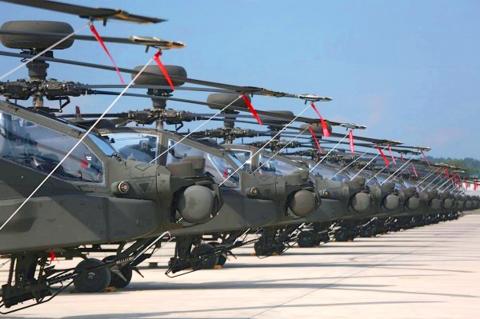The nation’s second squadron of Apache attack helicopters is likely to enter service later this year after the first squadron was commissioned last year by the Army Aviation and Special Forces Command, an army officer said yesterday.
After undergoing rigorous testing, the second Apache combat team is expected to be commissioned in the middle of this year, said the officer, who spoke on condition of anonymity.
The launch of the first squadron has shown that the Apache helicopters are combat-ready, while the formation of the additional squadron means it has full combat and defense capabilities, he said.

Photo: Courtesy of the Military News Agency
The command’s 601st Brigade has been training personnel and upgrading its equipment since 2013, the command said, adding that after more than two years of training, one of the two Apache squadrons was commissioned in June last year and has since then contributed greatly to improving the army’s combat capability.
Taiwan in 2008 ordered 30 Boeing AH-64E Apache helicopters from the US for about NT$59.3 billion (US$2.01 billion at the current exchange rate), including personnel training and logistics, and took delivery of the aircraft from November 2013 to October 2014.
One of the helicopters was destroyed in April 2014 after it crashed during a training flight in Taoyuan.
The AH-64E is also known as a “tankbuster.” It is equipped with powerful target acquisition radar that is capable of 360-degree operation for up to 8km, and can simultaneously track up to 128 targets and engage the 16 most dangerous, the command said, adding that it carries 16 Hellfire missiles and can deploy them in less than 30 seconds.
In related news, the army has decided to start phasing out its Bell UH-1H helicopters by the end of this year, even though there are not enough Sikorsky UH-60M Black Hawk helicopters to replace them, an anonymous defense official said yesterday.
Although the military originally intended to replace the army’s aging UH-1H fleet with the 60 UH-60Ms it bought from the US, half of the Black Hawks were later allotted to other aviation services, the official said.
President Tsai Ing-wen (蔡英文) and former president Ma Ying-jeou (馬英九) each ordered the reassignment of 15 aircraft to the Air Rescue Group and the National Airborne Service Corps respectively, leaving only 30 Black Hawks for the army, the official said.
While the army has held off retiring the UH-1Hs, their ready rate and maintenance costs are no longer acceptable, the official said.
The army believes that the government should buy another 32 UH-60M helicopters from the US, if budget allows, the official said.
Taiwan from 1970 to 1976 built 118 UH-1H helicopters under license, meaning that the last batch of airframes are 42 years old, the official said.
The army intends to donate some of the phased-out aircraft to technical training schools, they added.

Right-wing political scientist Laura Fernandez on Sunday won Costa Rica’s presidential election by a landslide, after promising to crack down on rising violence linked to the cocaine trade. Fernandez’s nearest rival, economist Alvaro Ramos, conceded defeat as results showed the ruling party far exceeding the threshold of 40 percent needed to avoid a runoff. With 94 percent of polling stations counted, the political heir of outgoing Costa Rican President Rodrigo Chaves had captured 48.3 percent of the vote compared with Ramos’ 33.4 percent, the Supreme Electoral Tribunal said. As soon as the first results were announced, members of Fernandez’s Sovereign People’s Party

MORE RESPONSIBILITY: Draftees would be expected to fight alongside professional soldiers, likely requiring the transformation of some training brigades into combat units The armed forces are to start incorporating new conscripts into combined arms brigades this year to enhance combat readiness, the Executive Yuan’s latest policy report said. The new policy would affect Taiwanese men entering the military for their compulsory service, which was extended to one year under reforms by then-president Tsai Ing-wen (蔡英文) in 2022. The conscripts would be trained to operate machine guns, uncrewed aerial vehicles, anti-tank guided missile launchers and Stinger air defense systems, the report said, adding that the basic training would be lengthened to eight weeks. After basic training, conscripts would be sorted into infantry battalions that would take

EMERGING FIELDS: The Chinese president said that the two countries would explore cooperation in green technology, the digital economy and artificial intelligence Chinese President Xi Jinping (習近平) yesterday called for an “equal and orderly multipolar world” in the face of “unilateral bullying,” in an apparent jab at the US. Xi was speaking during talks in Beijing with Uruguayan President Yamandu Orsi, the first South American leader to visit China since US special forces captured then-Venezuelan president Nicolas Maduro last month — an operation that Beijing condemned as a violation of sovereignty. Orsi follows a slew of leaders to have visited China seeking to boost ties with the world’s second-largest economy to hedge against US President Donald Trump’s increasingly unpredictable administration. “The international situation is fraught

GROWING AMBITIONS: The scale and tempo of the operations show that the Strait has become the core theater for China to expand its security interests, the report said Chinese military aircraft incursions around Taiwan have surged nearly 15-fold over the past five years, according to a report released yesterday by the Democratic Progressive Party’s (DPP) Department of China Affairs. Sorties in the Taiwan Strait were previously irregular, totaling 380 in 2020, but have since evolved into routine operations, the report showed. “This demonstrates that the Taiwan Strait has become both the starting point and testing ground for Beijing’s expansionist ambitions,” it said. Driven by military expansionism, China is systematically pursuing actions aimed at altering the regional “status quo,” the department said, adding that Taiwan represents the most critical link in China’s